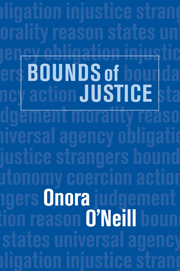Book contents
- Frontmatter
- Contents
- Preface
- Introduction
- Part I Philosophical Bounds of Justice
- 1 Four models of practical reasoning
- 2 Agency and autonomy
- 3 Principles, practical judgement and institutions
- 4 Kant's justice and Kantian justice
- 5 Which are the offers you can't refuse?
- 6 Women's rights: whose obligations?
- Part II Political bounds of justice
- Bibliography
- Index
5 - Which are the offers you can't refuse?
Published online by Cambridge University Press: 02 December 2009
- Frontmatter
- Contents
- Preface
- Introduction
- Part I Philosophical Bounds of Justice
- 1 Four models of practical reasoning
- 2 Agency and autonomy
- 3 Principles, practical judgement and institutions
- 4 Kant's justice and Kantian justice
- 5 Which are the offers you can't refuse?
- 6 Women's rights: whose obligations?
- Part II Political bounds of justice
- Bibliography
- Index
Summary
Coercion matters to almost everybody, and almost everybody thinks it wrong. Yet few agree on what counts as coercion. Theoretical investigations of coercion have often proposed ‘analyses’ of the concept, which rival theorists have submitted to trial by counter-example and found wanting. But no analysis has been generally accepted as convincing.
Looking for necessary and sufficient conditions for an offer to count as coercive, which are then to be tested by appeal to cases, strikes me as a reductio ad absurdum of a way of doing philosophy. The assumption that ‘our’ intuitions about possible examples and counter-examples can be treated as data, by which we may test, refute or confirm proposed analyses of necessary and sufficient conditions for the application of concepts, is an unpromising method. Trial by counter-example cannot get going unless there is agreement on the classification of cases; it breaks down when examples and counter-examples cannot be reliably distinguished. In discussions of coercion there is no agreement about cases: the long-running dispute between liberals and socialists about whether the wage bargain under capitalism coerces is only one of countless examples of disagreement. Any ‘intuitions’ invoked by protagonists in this debate reflect no more than different assumptions about who ‘we’ are; they offer an argument from (supposed) authority in contemporary dress rather than the prospect of a definitive analysis of coercion. For this and other reasons, I intend to say nothing about the vast philosophical and theoretical ‘literature’ on coercion. Instead I shall consult the experts.
- Type
- Chapter
- Information
- Bounds of Justice , pp. 81 - 96Publisher: Cambridge University PressPrint publication year: 2000
- 1
- Cited by



